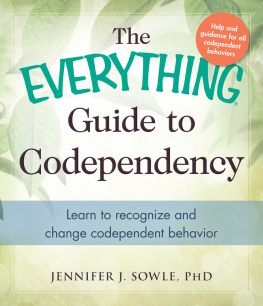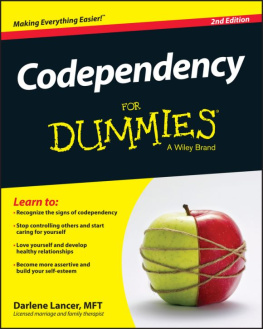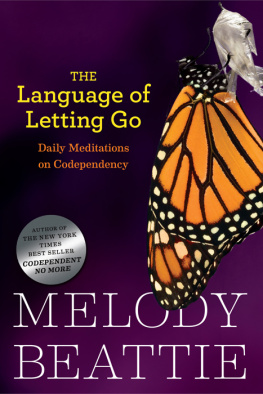ALSO BY MELODY BEATTIE
Gratitude
The Grief Club
52 Weeks of Conscious Contact
The Language of Letting Go Journal
Choices
More Language of Letting Go
Playing It by Heart
Finding Your Way Home
Stop Being Mean to Yourself
Journey to the Heart
Lessons of Love
Codependents Guide to the Twelve Steps
The Language of Letting Go
Beyond Codependency
Codependent No More

The names and details about some individuals have been changed.

Simon & Schuster Paperbacks
1230 Avenue of the Americas
New York, NY 10020
www.SimonandSchuster.com
Copyright 2009 by Melody and Company, Inc.
All rights reserved, including the right to reproduce this book or portions thereof in any form whatsoever. For information address Simon & Schuster
Subsidiary Rights Department, 1230 Avenue of the Americas, New York,
NY 10020
First Simon & Schuster trade paperback edition January 2010
SIMON & SCHUSTER PAPERBACKS and colophon are registered trademarks of Simon & Schuster, Inc.
The Simon & Schuster Speakers Bureau can bring authors to your live event.
For more information or to book an event, contact the Simon & Schuster
Speakers Bureau at 1-866-248-3049 or visit our website at
www.simonspeakers.com.
Designed by C. Linda Dingler
The Library of Congress has cataloged the hardcover edition as follows:
Beattie, Melody.
The new codependency : help and guidance for todays generation /
Melody Beattie.
p. cm.
1. Codependency. 2. Self-care, Health. I. Title.
RC569.5.C63B436 2009
616.869dc22 2008042271
ISBN 978-1-4391-0192-6
ISBN 978-1-4391-0214-5 (pbk)
ISBN 978-1-4391-1769-9 (ebook)
ACKNOWLEDGMENTS
Thanks to God, who keeps me writing;
Thanks to my mom, who in her passing helped us both discover love for each other;
and
A special thanks to Jim and Pam Leemy brother and sister-in-lawwho stepped in and made it possible for me to write this book. I finally found my brother.
FOR
People affected by someones alcoholism, addiction, illness, compulsions, hurtful or irresponsible behaviors, including anger management issues, rage, and abuse;
Double WinnersAlcoholics or Addicts with codependency underneathespecially those addicts and alcoholics who need to forgive themselves for having this disease;
People legitimately caretaking anyoneparent, child, or ill spousewho need to remember to take care of themselves, too;
Adult and Teenage Children of Alcoholics, Addicts, and parents whose problem affected (and still affects) us;
People codependent on codependents;
Classic codependents who want more information, peace, and power and are ready for an upgrade to Codependent No More;
Men, women, and children who have been sexually, physically, or emotionally abused;
People who turned an idea (codependency recovery) intended to free us into another set of repressive, fundamentalist rules;
People who need to attend meetings all their lives. For them, codependency can be fatal. As one woman said, Ill die if I stop attending groups. Thats how badly codependency affects me.
People who need to go to groups for a while;
People who hate the word codependency and dont need to go to groups or therapy at all;
People affected by mutated codependencysurvival behaviors that have adapted to the changing world. Its easier to take antidepressants and antianxiety drugs to mask codependencys emotions and depression than it is to deal with feelings and get to the core of the problem, but it wont bring us what were seeking.
The New Codependentspeople who need help taking care of themselves in a changed world whether they choose to identify as codependent or not;
The new me. I dedicated Codependent No More to me because healing from it saved my life, but I still felt alone. After twenty years of learning to set limits and take care of myself, I know that Oneness isnt a clich. Its a codependent illusion. Its impossible to be alone when we know how connected we are to God, other people, and Life. Thats why this book is dedicated to Us.
CONTENTS
SECTION ONE

Crossing Lines and Getting Back over Them Again
1 . Taking Care of Ourselves
I know what its like to lose yourself so badly that you dont know if theres a you or ever was one. I spent thirty years not knowing what boundaries were and another ten learning to set them. I gave until I was depleted and needed someone to take care of me. I threatened, begged, hinted, and manipulated to get what I wanted. I was convinced that I knew what was best for other people. I got so busy teaching them their lessons that I forgot to learn mine.
Within minutes of meeting a man, I was sure Id met my soul mate. A few hours later, Id fantasize about the wedding. Thats how it happened on television. Isnt that how it happened in life? Id spend two years trying to get into a relationship, and the next five trapped, clawing my way out. I obsessed until my head ached. Literally, it hurt. I didnt know what feelings were. Whenever I said I felt something, people said, Dont feel that!
Like millions of other women and men, I was victimized as a child. Instead of holding the perpetrators responsible, I blamed myself. Theres something wrong with me, I thought. I didnt see the bad things that happened to me happening to anyone else. Feeling like we caused the problem is a legitimate stage of grief. Feeling ashamed is normal when weve been abused. Blaming ourselves is a survival skill. It helps us feel in control when life doesnt make sense and being abused doesnt make any sense at all.
Besides, arent women supposed to suffer? We sacrifice ourselves. I became a martyr. I thought taking care of other people was my job. If I took care of them, I hoped theyd return the favor and take care of me. But that didnt happen. People expected me to take care of them once I started that pattern. There were many reasons I didnt take care of myself. The word no wasnt in my vocabulary. Good people were selfless. Loving myself was out of the question. Selfish! But the biggest reason I didnt take care of myself is that I didnt know how to.
Many of us didnt (or dont) know about self-care. It wasnt written about in books or talked about in school. We get user manuals for simple products, but we dont get a handbook for life. We stumble through complex situations, figuring things out for ourselves. Controlling and taking care of othersthe entire package of codependent behaviorsbecome survival tools, living skills that we think will keep us safe. Then one day these behaviors turn on us. Our relationships and lives stop working and we dont know why. By then these survival behaviors are habits. Theyre all we know how to do.
If I had the years back I spent worrying about how the things I couldnt control were going to turn out, Id have a third of my life to live over. That would be a life in which I wouldnt feel responsible for everyone or feel guilty all the time. I wouldnt waste energy controlling, enabling, and obsessively rescuing peoplethe helpful things codependents do that dont really help. Id let people take care of their responsibilities and Id take care of mine. I wouldnt let people hurt me. Id set boundariessay no. I wouldnt do only what other people wanted me to do; Id do what I wanted, too. This time my giving would come from my heart, and my helping would actually help. I wouldnt judge everything that happened as wrong, including what I did, said, thought, and felt. Id let life unfold, people be who they are, and Id let myself be me. This time, Id have the courage to experience true love.
Next page
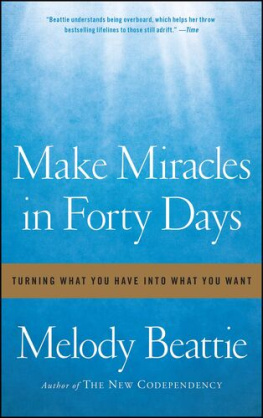
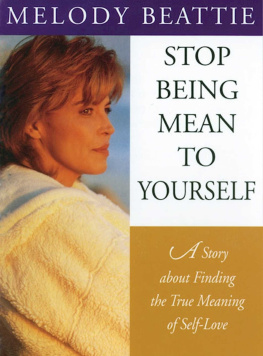
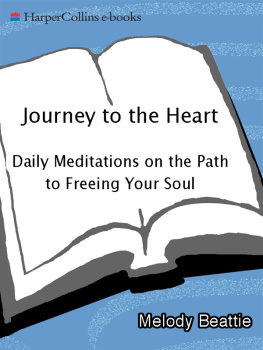
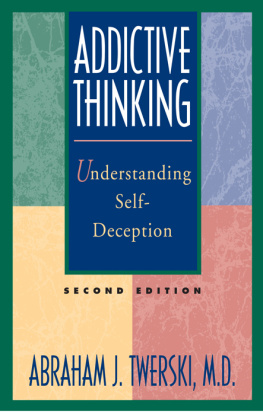
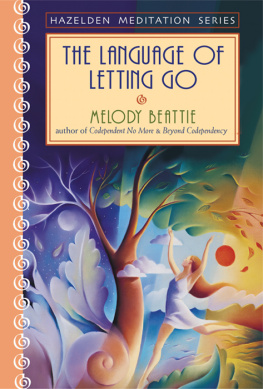
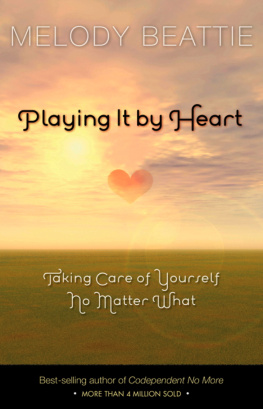
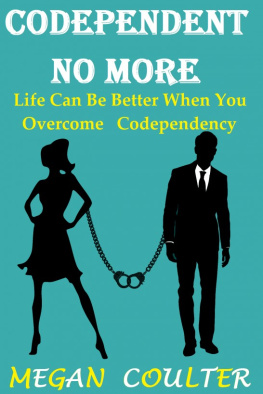
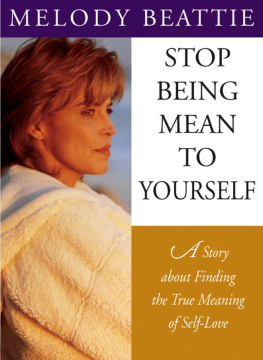
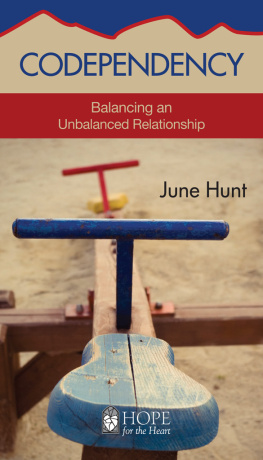
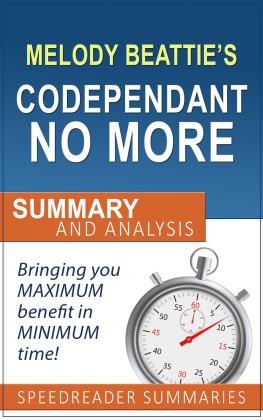
![Beattie - Melody Beattie bundle: [a collection of four Melody Beattie best sellers]](/uploads/posts/book/249274/thumbs/beattie-melody-beattie-bundle-a-collection-of.jpg)
